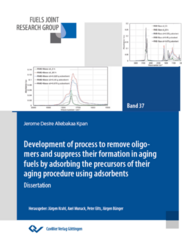| Fachbereiche | |
|---|---|
| Buchreihen (96) |
1381
|
| Nachhaltigkeit |
3
|
| Gesundheitswesen |
1
|
| Geisteswissenschaften |
2370
|
| Naturwissenschaften |
5408
|
| Ingenieurwissenschaften |
1795
|
| Allgemeine Ingenieurwissenschaften | 292 |
| Maschinenbau und Verfahrenstechnik | 862 |
| Elektrotechnik | 688 |
| Bergbau- und Hüttenwesen | 30 |
| Architektur und Bauwesen | 75 |
| Allgemein |
98
|
|
Leitlinien Unfallchirurgie
5. Auflage bestellen |
|
Erweiterte Suche
Development of process to remove oligomers and suppress their formation in aging fuels by adsorbing the precursors of their aging procedure using adsorbents (Band 37)
Jerome Desire Aliebakaa Kpan (Autor)Vorschau
Leseprobe, PDF (170 KB)
Inhaltsverzeichnis, PDF (160 KB)
The degradation of fuel over time can lead to the formation of undesirable oligomers, which negatively impact fuel quality and performance.
This publication describes the development of a novel process to remove oligomers and suppress their formation in aging fuel. The proposed approach involves adsorbing the precursors responsible for the aging process using adsorbents.
Through comprehensive experimental investigations, the effectiveness of different adsorbents was evaluated, and the optimized process conditions were determined.
The results demonstrated that the developed process efficiently mitigates the formation of oligomers, thereby enhancing fuel stability and prolonging its useful life.
This research has significant implications for the petroleum industry, providing a practical solution for improving fuel quality and reducing operational challenges associated with fuel aging. By mitigating the formation of damaging oligomers and rejuvenating aging fuels, we are poised to reduce maintenance costs, enhance fuel efficiency, and extend the operational life of lubricants in the midst of biofuel usage.
Suppressing the formation of harmful byproducts in aging fuels, we are advancing cleaner, more sustainable energy solutions.
| ISBN-13 (Printausgabe) | 9783689529680 |
| ISBN-13 (E-Book) | 9783689529697 |
| Buchendformat | A5 |
| Sprache | Englisch |
| Seitenanzahl | 330 |
| Umschlagkaschierung | glänzend |
| Auflage | 1 |
| Buchreihe | Fuels Joint Research Group - Interdisziplinäre Kraftstoffforschung für die Mobilität der Zukunft |
| Band | 37 |
| Erscheinungsort | Göttingen |
| Erscheinungsdatum | 11.09.2024 |
| Allgemeine Einordnung | Dissertation |
| Fachbereiche |
Ingenieurwissenschaften
Fahrzeugtechnik Umwelttechnik |
| Schlagwörter | Oligomers, Fuel, Precursors, Energy, Emissions, Adsorbents, Kraftstoffalterung, Lubricant, Crankase, Oxidation, Fossil, Degradation, Brodiesel, Viscosity, Esters, Hydrotalcite, Fats, Density, Suppression, Biofuel, Saturation, Antioxidant, oil, Transesterification, Stabilization, Environment, Radicals, Transesterification, Stabilization, Environment, Radicals, Blends, Vegetable oil, Base oil, Susceptible, Volatility, Autoxidation, Acid number, Acidity, Hydroperoxide, Permittivity, Aging, Hydrocarbons, dilution, Biogenic, Fuel aging, Oligomer removal, Fuel stability, Oligomer suppression, Kraftstoffalterung, Oligomerentfernung, Adsorbentien, Vorläufer der Alterung, Kraftstoffstabilität, Adsorptionsprozess, Alterungshemmer, Kohlenwasserstoffbrennstoffe, Oligomerunterdrückung, Reaktionswege, Kraftstoffverschlechterung, Adsorptionskinetik, Polymerisation, Kraftstoffqualität, Kraftstoffverunreinigungen, Adsorbierende Materialien, Alterungsmechanismen, Thermische Stabilität, Kraftstofflagerung, Alterung von Kohlenwasserstoffen, Kraftstoffaufbereitung, Molekulare Wechselwirkungen, Adsorptionseffizienz, Chemische Alterung, Kraftstoffzusätze, Heterogene Adsorption, Lösungsmitteleffekte, Oxidationsstabilität, Schadstoffbeseitigung, Kraftstofflebensdauer, Alterungsnebenprodukte, |








